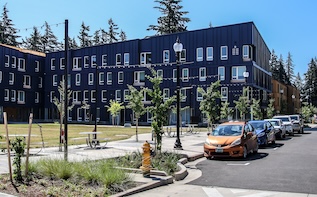- Home
- Government
- Fire and Police Levy
Government
Fire and Police Levy
In May 2024, Gresham voters passed Measure 26-247, the five-year operating levy for fire and police.
Gresham delivers on safety: Early wins from historic safety levy
Thank you, Gresham
This tremendous vote of support has charted the path for more sustainable funding for our Police and Fire departments, and as a City, we are grateful.
Watch Fire and Police Levy videos
Levy updates
- Fire Department
- Police Department
- Public Safety Levy Advisory Subcommittee
- A second fire rescue vehicle is now staffed, the first new 911 unit in over 30 years, handling medical and other calls with greater speed and efficiency than an engine. Sixty-five percent of Gresham Fire’s calls are medical emergencies.
- School safety inspections resume this spring, making our schools and families safer.
- Firefighter hiring and training is underway to meet the community’s safety needs.
Want to become a firefighter? Know someone who might be interested?
Public service careers: Meet Chandra: Firefighter
- New recruitment programs and events are drawing a significant increase in applicants.
- Focused missions to address retail theft, vehicle theft, and traffic safety are targeting areas of concern for the community.
- A school liaison officer is working closely with school districts to address safety concerns and share information, supporting a safe learning environment for students.
- An officer is now assigned to the Neighborhood Engagement Team, tackling livability issues that matter most to residents.
- A team of Community Safety Specialists is handling non-emergency calls and staffing the Rockwood Public Safety Building, making it easier for the community to report crimes and access police services.
We promised voters that if the levy passed, an oversight committee would be created to ensure accurate and appropriate spending of levy funds.
The creation of this committee, a subcommittee of the Finance Committee, has begun. As with other Council-appointed committees, there was an application process for interested Gresham residents wishing to participate. Applications were reviewed Feb. 1 and are now closed.
More about the Public Safety Advisory Subcommittee
Frequently asked questions
Levy revenue would be placed in a dedicated and protected account overseen by a seven-member committee of Gresham residents. The committee will make annual reports to the City Council and levy spending would be audited each year. The levy would raise an estimated $64 million over five years ($12 to $14 million each year).
The measure authorizes a five-year levy, which would provide tax revenue to fund existing fire and police personnel and hire more firefighters and police officers to provide services for the growing population and the growing demand for emergency first responders.
The measure would cost $1.35 per $1,000 of assessed property value. The owner of a home assessed at $200,000 would pay about $25.65 per month or about $308 per year.
Over the past 20 years, Gresham’s population has increased by 19%, but today the city has one less sworn police officer than in 2004, while in recent years shootings in Gresham have increased by more than 400%.
And over the past 30 years, Gresham’s population has increased by 46% while the daily minimum staffing for the Gresham Fire Department has remained the same as it was in 1994.
If the measure passes, a five-year levy would authorize new tax revenue, which would fund fire and police positions. The levy would help retain existing fire and police positions and would fund 13 new firefighters and 9 new police officers in Gresham.
Hiring more firefighters and police officers would mitigate emergency response times and fund more neighborhood patrols and enhance public safety.
Gresham voters considered a similar Measure in 2023 (proposed $1.50 per $1000 of assessed property value) but the measure did not pass. Gresham has since studied voter attitudes toward funding fire and police services. More than 230 city residents participated in an online questionnaire and a community town hall providing feedback. In addition, the city hired a local independent research firm – DHM Research – to conduct focus groups and a scientific poll of 400 city voters to better understand community issues and concerns.
Gresham took this information into consideration when drafting the proposed May 2024 measure. If passed, the measure would cost $1.35 per $1000 of assessed property value and focus the levy exclusively on retaining and adding more firefighters and police officers to address public safety concerns.
More Gresham Police Officers
The five-year levy would fund 9 new sworn police officers – a 7% increase over existing sworn officer positions. Overall, the levy would fund a 17.5% increase in total Gresham police personnel to enhance public safety. More sworn officers serving the community would mitigate response times and allow for dedicated detectives to investigate all types of crimes. With more officers, GPD could restore specialty police units, including Neighborhood Enforcement Team, Traffic Enforcement Team, and other specialty that both prevent and investigate crime.
More Gresham Firefighters
The five-year levy would fund 13 new firefighters to improve emergency response times and would provide an additional rescue truck to Gresham’s busiest fire station. The levy would add two additional Fire Marshals to conduct school inspections, business inspections, support arson investigations, and provide school education.
Beginning July 1, 2024, the five-year levy would cost each property owner $1.35 per each $1,000 of assessed property value. The average home in Gresham has an assessed value (not real market value) of $228,000. The levy would cost the average homeowner in Gresham $25.65 a month or about $308 per year.
An amount that, if passed by voters, would be collected through a property tax charged to each property owner (residential and commercial) within the city of Gresham’s boundary. The levy would require a simple majority vote of 50% + 1 to pass.
Property owners in Gresham pay for the levy. The cost is added to their property tax bills, and the amount each owner pays varies based on the assessed value of their property, not the real market value. The tax would not be paid by anyone who is not a property owner.
While Gresham is home to a few tax-exempt multifamily housing complexes, for all other multifamily properties, the cost of the levy would be passed along to the property owner. Landlords would determine whether or not to extend additional fees to their tenants.
When a person buys or sells a home, the price paid is the “real market value.” If not readily ascertainable, real market value can be estimated by a real estate agent or via public websites like Zillow.
However, the levy is not based on the real market value of a home. It is based on the “assessed value” of the home. Due to Ballot Measure 50, enacted by voters statewide in 1997, the assessed value is based on its real market value in 1995, minus 10%, plus 3% a year. As a result, the assessed value is typically much less than the real market value.
You can find the assessed value of a property on Multnomah County Property Records. Choose “continue as a guest” to use this service for free.
No. The levy would be in addition to the Police, Fire and Parks Fee. The $15 per month fee paid on utility bills funds 9% of existing public safety services. Of the total fees paid, 95% is spent on public safety and 5% on parks. The fee is not enough to fund additional firefighters and police officers.
The City of Gresham currently has a shortfall of almost $19 million for its 24/25 fiscal year general fund budget that the City Council must close when it adopts a balanced budget in June.
The shortfall stems from many economic factors, including increased demand for services and population growth, rising costs driven by inflation that impact the City the same as individuals and families, and the volatility of city business income tax. In recent years, City revenues have increased about 3% each year while expenses have increased by about 6% per year. This is for current service levels without new positions.
A levy is a tool that the City Council is proposing to provide funding for fire and police services.
For context, for the fiscal year 2023/24, the City of Gresham General Fund revenue is approximately $92.7 million for a population of about 114,000 (2021) while the City of Hillsboro's General Fund revenue is approximately $164.3 million for a population of 107,000 (2021).
Gresham is the fourth largest city in Oregon but Hillsboro, the fifth largest city, has a 56% larger budget (based on 2023/24 budgets). Historically, Gresham has taken a conservative approach to budgeting and spending. In the past three years, the city eliminated 30 positions, including several high-level management jobs, and cut $8.7 million in expenses from its adopted budget. Most recently, they cut three positions and didn’t fill five open positions to realize cost savings. The city has carefully used federal (ARPA) funds and increased the monthly Police, Fire and Parks fee to avoid making cuts to public safety.
In addition to controlling costs and pursuing a levy, the city is pursuing federal, state and county grants to bring tax dollars back to Gresham. In the past year, the city has secured more than $30 million in grants for various programs and projects, including park upgrades, transportation improvements and youth violence prevention programming.
If the measure passes, it would fund new fire and police personnel to help address homeless services. As for new funding and resources, Gresham is actively pursuing funding from Multnomah County from the existing regional homeless services tax. This year, the county government has more than $250 million available to spend on homeless services. In addition, city government is seeking state and federal funds and Metro to address homelessness.





